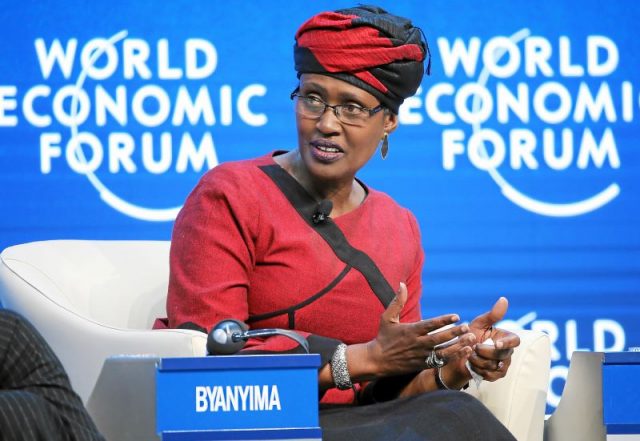…UN Undersecretary-General Winnie Byanyima says denying life-saving vaccines to people of colour is a form of “policy violence” amounting to racism
…She joined a panel looking at what progress has been made by companies in their commitments towards diversity, equity and inclusion
THUR, 26 MAY, 2022-theGBJournal| A top United Nations official at the Annual Meeting of the World Economic Forum 2022 declared that “policy violence” – such as the refusal to share COVID-19 vaccines with the Global South – is as racist as the police violence that ended the life of African-American George Floyd in Minneapolis two years ago today.
“Racism is not only when black people or brown people cannot breathe because of police violence. Racism is when black people, brown people, people of colour take their last breath because of policy violence, when they are denied life-saving, pandemic-ending medicines… when they can’t access care or education because debt is choking them. That’s racism,” said Winnie Byanyima, Undersecretary-General of the United Nations and Executive Director of the Joint United Nations Programme on HIV/AIDS (UNAIDS), speaking at a session on racial equity at the World Economic Forum 2022.
Some 18 months after the first COVID-19 vaccines became available, 75% of people in high-income countries, mainly white, are fully vaccinated, while just 13% of people in low-income countries, mostly brown and black, are vaccinated, she said. “Wouldn’t you call that racism?”
Byanyima pointed the finger at the companies and governments that had invested in the vaccines. She drew a parallel with the HIV/AIDS pandemic, when antiretroviral treatments made available in the United States allowed those with the disease to live long and happy lives. Yet for 10 years, countries in the Global South demanded the producers of these treatments to lower their prices, while “12 million people died unnecessarily”.
Cheryl Dorsey, President of Echoing Green, highlighted the failure of leading companies to deliver on pledges made at the height of the Black Lives Matter movement. “As of January this year, by some measures, only 1% of the $67 billion pledged toward racial equity by the largest companies in the world has been dispersed,” she said. She added that “only 22 Fortune 500 companies fully cover race and ethnicity in their ESG reporting”, while over 48,000 posts for directors and vice-presidents of diversity, equity and inclusion (DEI) in US companies remain open.
Pam Chan, Chief Investment Officer and Global Head of the Alternative Solutions Group within BlackRock Alternative Investors, said her company had signed up to a third-party racial equity audit of her firm to identify areas where they could do better. “It’s not until you actually look at that stuff that’s kinda ugly that you can fix it,” she said. Chan outlined how the company has made the creation of an inclusive culture part of its performance reviews and compensation processes.
Alex Liu, Managing Partner and Chairman of Kearney, identified middle management as the problem. “This is about power, who holds it, who’s in the room, who’s deciding on promotion decisions, who’s funding it.” The leaders of companies can frame commitments and pledges, he said, but “the problem is the middle of the company, that’s where the power is”.
Twitter-@theGBJournal| Facebook-The Government and Business Journal|email: gbj@govbusinessjournal.ng|govandbusinessj@gmail.com










